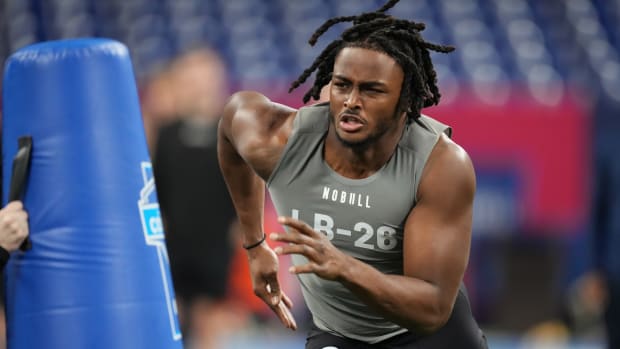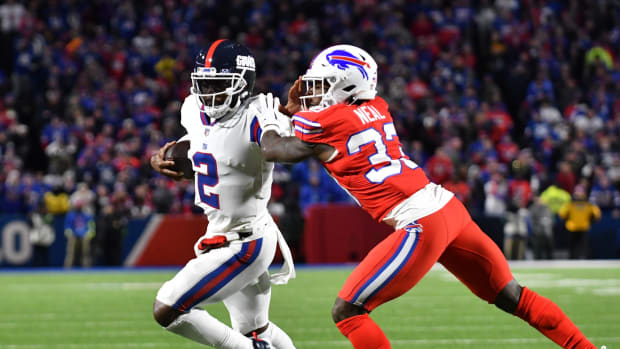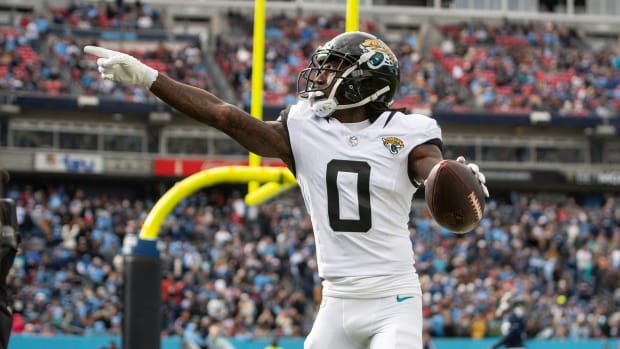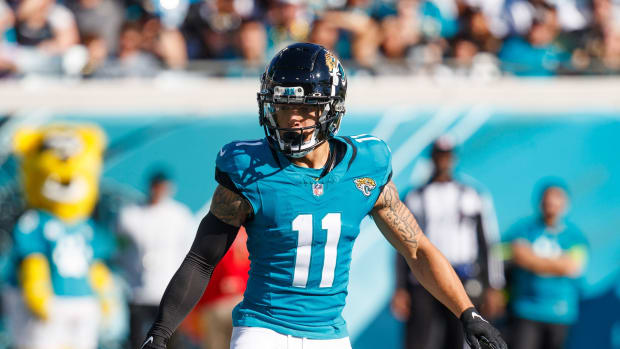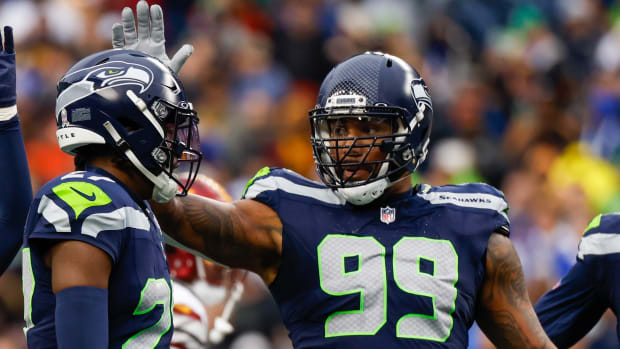Halfway through this NFL season, 31 of 32 teams have won a game. Dan Campbell is coaching the other one. His Lions have struggled even by Lions standards. But look closer, and you see that he might just pull off one of the hardest tasks in sports: creating a winning culture while his team loses.
From the moment Detroit granted Matthew Stafford’s request for a trade last winter, Campbell has been coaching a rebuilding team—which happens all the time in sports and yet is still so much harder than most people realize. Campbell is not just preparing for games. He’s straddling the line between today and tomorrow.
Every conversation has invisible potholes. Campbell prides himself on being honest with players but also on staying positive—a difficult combination at 0–8. He needs them to focus on the little things that nobody notices, and ignore the big things that everybody is discussing. He must make placeholder players feel important without promising they will get to stick around. When the Lions drafted Oregon offensive tackle Penei Sewell with the seventh pick in April’s draft, Campbell’s first piece of advice to Sewell was: Be confident. That’s another tough trick at 0–8. Believe in yourself, he says. But also: Acknowledge how much this hurts.
“It’s a natural thing for us, as human beings: When things get hard, you numb yourself. … You become content,” Campbell says. “You don’t care enough [about] what’s going on so that you don’t get hurt—and [that’s] the worst thing you can do.
“So, I just try to encourage these guys: You should feel every bit of it. The taste of losing should drive you to want to get out of it. That’s something we can never lose.”
Every loss sticks to the head coach. Quarterbacks have passer ratings and defensive ends have sack totals, but a coach just has his record. Some coaches would be annoyed by this and try to shift blame, even subtly. Campbell refuses to do that. The Lions are 0–8 mostly because they lack talent, but, Campbell says, “We can’t fall into this trap of, Well, we don’t have enough talent.” It would also be easy for him to take too much blame, to shield his players, but he doesn’t want to do that, either.
The Lions have had more injuries this season than they can afford; senior defensive assistant Dom Capers thinks back to Detroit’s offseason team activities and says “a few of the guys we have started, you didn’t even know were going to be around.” Blaming injuries would be easy. Saying “next man up” is also easy. But this is more nuanced than that. Campbell cannot scream at his players to play harder if they’re playing hard and failing anyway. That, Capers says, “is when you lose the team. You can’t be overly critical if a guy’s giving you everything he’s got.”
On Sundays, Campbell finds himself coaching two games at once: the one his team is playing, and the long game. With 1:58 left in Detroit’s 34–11 loss to Cincinnati on Oct. 17, the Bengals took a knee, signaling the start of the end of the proceedings. Campbell, though, immediately called a timeout. Cincy ran for four yards … and Campbell called timeout again. This is something coaches typically do when they’re sore about losing, or to signal their players to keep believing. Campbell did it as a test.
“I want to know how we’re going to respond,” he said. “I want to know: Does it bother you enough to continue to fight to the end?”
The Lions’ eighth loss, two weeks later, was their worst: 44–6 at home, to a bad Eagles team. Twelve years earlier, a similarly awful Detroit team got obliterated in Baltimore, and coach Jim Schwartz threw a fit on the sideline, then seethed afterward. Campbell has better control of his emotions. With four minutes left in the game against Philadelphia, he quietly focused on who was still combining effort with concentration, as though the result were still in doubt.
“I am highly sensitive and highly alert to, What does this guy look like?” Campbell says. “What does it look like when you’re getting doubled, when the scoreboard is what it is? I think it’s highly telling. … I’ll be honest with you, I saw some good things [at the end of the Eagles game.] I really did.”
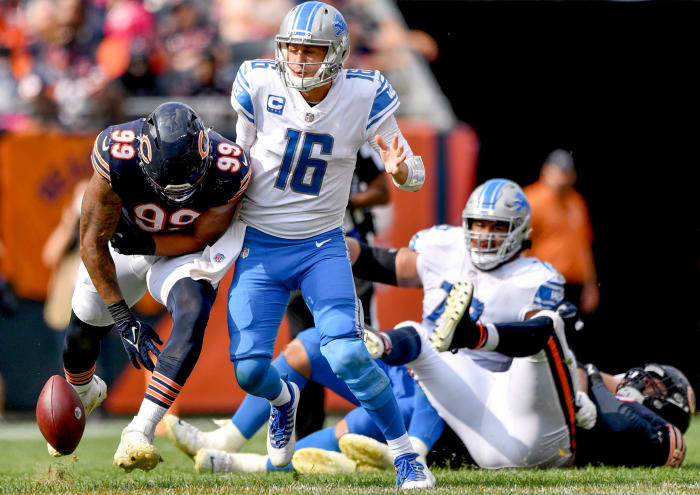
In the rebuild, Campbell ended up with Goff (whose eight passing TDs rank no. 23 in the NFL) and lost Stafford (whose 23 TDs with the Rams are no. 2).
Jamie Sabau/Getty Images
After every game, Campbell watches the film with an orange highlighter in hand, marking each play where Detroit made a mistake “that had nothing to do with talent.” Presnap penalties are the most obvious, but there has been a bevy of small moments that only a coach would see, like this:
“[The opponent] does a simple shift or a motion, and we’re not talking [in the defensive backfield],” Campbell says. “And so now I don’t know where my help is at, and I’m the corner. ... Or I’m tilted the wrong way, so I’m not even using my help, and I get beat on an explosive pass. Those have nothing to do with talent.”
After the Eagles game, for the first time, he showed this work to his coaches. “It was littered with orange in there,” he says. Campbell is not just coaching players. He is coaching coaches, too, and he can’t let them blame talent.
Then, last week, he did something he had not done all fall. He talked to his team about its record.
“I heard that our players had been asked about going 0–17,” he says. “So I brought it up: ‘Are you kidding me? We got nine games left. The only thing we can worry about is what’s right in front of us.’ If we sit here and start thinking about, Man, what if?, what does that do? Doubt permeates into your brain, and throughout the team.”
Campbell, when he was hired, needed just one press conference to go from coach to caricature. There are now two kinds of people: those who have never heard of him, and those who know him as the Kneecap Guy.
“We’re going to kick you in the teeth, all right?” he said in January. “And when you punch us back, we’re going to smile at you. And when you knock us down, we’re going to get up, and on the way up we’re going to bite a kneecap off. All right? And we’re going to stand up, and it’s going to take two more shots to knock us down. All right? And on the way up, we're going to take your other kneecap, and we’re going to get up, and then it’s going to take three shots to get us down. And when we do, we’re going to take another hunk out of you.”
Those who know Campbell well swear that this was an authentic moment. But it also created an image of him as a lunkhead football coach with no perspective, trying to win games like it’s 1960—and that’s not Campbell at all.
He doesn’t rule through intimidation. He doesn’t smash things in the locker room for effect. He doesn’t prepare long Gipper speeches. A few days before Detroit’s first game, he told Sports Illustrated he had no plans for how he might address the team.
“We can get into this world of We’re the underdog, and, you know, We’re always the ones that nobody respects, but ultimately none of that matters,” Campbell said then. “You’ve got to earn the right for people not to say that about you.”
Quarterback Jared Goff says: “A coach that’s yelling and screaming every day is gonna get [people] numb eventually. When [Campbell] gets hot, it’s for good reasons.” Tight end T.J. Hockenson says Campbell has lost his temper, but “never for something that we thought he shouldn’t have. It’s all warranted.”
Campbell mostly just keeps it real, addressing every male he meets as “man” and repeating sentences when he wants to drive home a point. Football people love saying that theirs is a game of emotion, but it’s really a game of controlled emotion—of violence that ends as soon as the whistle blows, of intensity melded with intelligence and patience. Goff praises Campbell’s ability to “stay the same every day, regardless of our results right now. That’s the hardest thing to do.” Hockenson says that after Ravens kicker Justin Tucker beat the Lions on an NFL-record 66-yard field goal as time expired in Week 3, Campbell “would have had the same speech,” whatever the outcome had been.
Campbell worked under Sean Payton in New Orleans before going to Detroit. A lot of assistants become head coaches and think they suddenly need to establish their authority. Lions offensive coordinator Anthony Lynn, who coached the Chargers the past four seasons, says this is a mistake. Authority comes with the title. They should establish relationships. That’s the only way to build trust.
With the Chargers, he says, “People would sometimes say to me, ‘Coach, guys are scared to death of you.’ I’m like: ‘Me? I'm the nicest guy in the world!’ Now that I’m not the head coach anymore, players actually talk to me.”
Campbell is conscious of this dynamic. He says that when he retired as a player and joined the Dolphins’ coaching staff, after 10 seasons at tight end with the Giants and Cowboys and Lions, “I never thought about [being a] head coach. I really didn’t. I loved coaching tight ends. And, man, it would be cool to be [offensive coordinator] one day.” Then, in 2015, Miami fired his boss, Joe Philbin, and put Campbell in charge. He could have overcompensated for his inexperience. Instead, he acknowledged it.
“I was working under an offensive coordinator, and then I just leapfrogged, and then he was doing what I was asking him to do,” Campbell says. “And that’s not easy. From Day One, I [told the coordinators]: ‘Hey, there’s an argument that one of you should be the head coach right now—and I get that.’ ”
He says he was surprised to find that being a head coach “fit like a glove. Within a few days, it felt right. I was made for it. It was almost like a calling for me, I guess.” Some coaches excel at play design and teaching one-on-one but struggle at running a whole operation. Campbell is both a natural leader and a natural manager.
One story from his days as a Dolphins assistant might capture why the Lions like him so much. After that 2015 season, Miami interviewed Campbell, the stand-in, for the Dolphins’ permanent head-coaching job. They also interviewed Lynn, who knew Campbell from his days in Dallas, when Lynn was a Cowboys assistant. In Miami, Campbell was still the interim coach, and he hoped to land the permanent job, but he helped Lynn prep for his interview.
Lynn remembers this as an extraordinary act of kindness in a hypercompetitive and paranoid profession. Campbell remembers it as normal human behavior.
“I’m not into that world, man,” Campbell says. “It means more to be able to help—and, so be it, if you win [the job] over me, then good for you, it wasn’t meant to be then. But for me to turn my back on [Lynn], I’d feel guilty forever for that. Just imagine if that’s all we did as a society.” (Ultimately, Adam Gase got the Dolphins job.)
Capers calls finger-pointing “the first sign of a losing team,” but several times this season Campbell has shown a willingness to point one at himself. In training camp, he came up with a new drill that added a few linemen to a 7-on-7 play, and, he says, “it was a mess. I don’t even know how to explain it to you—it was just, man, it was unorganized.” After a few plays, Campbell says he ended the drill and announced he was fining himself. He let a player count the money in front of the team.
“I think I ended up putting in 400 bucks,” he says. “I wanted it to hurt a little bit.”
Another example: In the final 30 seconds of the first half against the Eagles, the Lions faced third-and-1 at the Eagles’ 22-yard line, down 17–0. Campbell had two timeouts. He declined to use one, thinking he could run a quick play, get a fresh set of downs, and then have those two chances to stop the clock.
“I’m being too cute,” he said later. “I should have had us use the timeout. Now I have us just rush to the line. We don’t get it. Now we’re fourth-and-1. … Well, now I gotta use a timeout, anyway. I mean, it was dumb, you know? That’s not smart.”
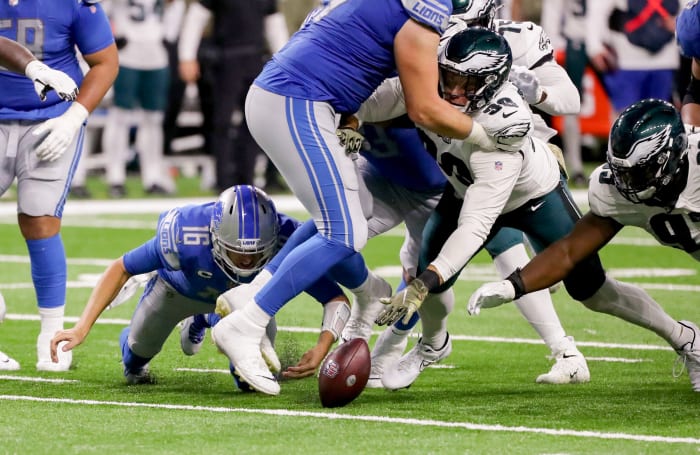
Campbell on the sting of 0-8: “You should feel every bit of it. The taste of losing should drive you to want to get out of it."
Kirthmon F. Dozier/USA Today Network
Campbell told the whole team he messed up. Of course, keeping those timeouts in his pocket is not why the Lions lost 44–6. But a coach who emphasizes details for his players also must emphasize them for himself.
Campbell has a natural presence, but he is not addicted to the the sound of his own voice, or to the ideas that happen to come from his own head. He is involved in all three facets of the game plan, but he does not micromanage any of them. He estimates that he has called “eight to 10” specific plays himself this year, but mostly he guides and then defers to Lynn.
As much as any new coach, Campbell has also embraced modern strategies. In Week 5, when the Lions scored a touchdown to pull within one of the Vikings, 16–15, with 37 seconds left, Campbell went for two, something coaches do far less frequently than they should. (Detroit made the conversion and lost, anyway.) The 2021 Lions have gone for it on fourth down 21 times, more than any other team. (Two other times they planned to go for it but committed a false start and punted instead.) On these occasions, Campbell is not being impulsive; whenever Detroit is in a situation where he’s prepared to go for it, he’ll tell Lynn earlier in the possession, so the coordinator can call second- and third-down plays knowing that they will go for it on fourth.
Campbell pops into every meeting room throughout the week, in part because “I think it’s good for them to see their head coach in there a little bit. I’m not trying to be the principal. I want them to know that, Man, I’m in there because I’m invested in this, too.” Sometimes he slips into a meeting room, listens, and walks out without saying a word. Players have been pleasantly surprised that he not only asks about their families but remembers what they share. And yet, the toughest relationship Campbell must manage is not between player and coach. It is between now and later.
In April, the Lions used their first draft pick on Sewell, a classic best player on the board selection. If Sewell becomes an All-Pro, pundits will say that Detroit made a wise draft choice. But picking the right guy is only the first step. Sewell, like plenty of high draft picks, is a supreme but unrefined talent. Though he was a consensus top-10 prospect, he had not played a game in two years, having opted out of the COVID-19-affected 2020 season to prepare for the draft. He played left tackle at Oregon, but the Lions already had a good left tackle in his prime, Taylor Decker. Giving Decker’s spot to Sewell when he hadn’t yet earned it would have upset a key veteran, and it would have sent the message to teammates that winning this year doesn’t really matter—which would have made Campbell’s daily encouragements seem fraudulent.
The Lions put Sewell at right tackle, where he struggled at times during the preseason. Then Decker got hurt, and Sewell shifted to the left—just in time for Week 1 against the 49ers, with Pro Bowl pass rusher Nick Bosa. Offensive tackles, like cornerbacks, must learn to move on from getting beat, but Campbell made a conscious decision not to discuss that with Sewell preemptively.
“You’ve just got to teach him on the fundamentals, and you got to let him go,” Campbell says. “You just want him to be able to play loose and trust what he’s been taught to do.” You have to be careful, the coach warned, about too often saying, Hey, it’s O.K., you’re gonna give up a sack.”
Sewell played well in that opener, and has played well since, leading to a discussion among the fans about whether he should stay on the left side when Decker returns. But Campbell has consistently said Decker will play left tackle when he returns. He trusts that Sewell will handle the move back to right tackle well. All season, the Lions have convinced Sewell to focus on today, not on his career. At Oregon, Sewell could afford to have concentration lapses and still dominate—“in college,” he says, “everyone’s kind of new, still trying to find themselves, and you can get away with a lot of things”—but not in the NFL. Now he says he focuses on “just one thing” every day.
Campbell: “Ultimately, the brain can only do one thing at a time.” For Sewell, one day, he works on his stance. The next: where his eyes are focused. The next: how he uses his hands. He says that “if I get too cloudy and I think about too much, I’m not able to play fast, with that same aggression.” Eventually, his coach says, the fundamentals of the position will become ingrained. In the meantime, concentrating on one aspect of the job each day helps Sewell improve—and allows him to feel like he is winning, even when his team is not.
This tug-of-war between now and later often extends to the coaches and the front office. In the NFL, everyone is on the clock, which leads to a peculiar dynamic: Whoever entered the building most recently has the most power. When newly appointed Lions general manager Bob Quinn decided to retain coach Jim Caldwell in 2016, Caldwell was beholden to him. But when Quinn later fired Caldwell and hired Matt Patricia, Quinn had to cater to Patricia’s wishes.
Campbell and new GM Brad Holmes were both hired in January, but as part of separate processes. Theirs was a shotgun marriage, which can create problems. But it also solves one: Because they arrived at the same time, they are on the same timetable. There is no push and pull between a GM thinking long-term and a coach who needs to win now.
It is hard to capture just how awful the Lions have been for most of their existence. But maybe this will do it: The Browns have won as many playoff games in 2021 as the Lions have won since 1957. Theirs is a lifetime of ineptitude that has rendered them a competitive nonentity, incapable of trash talk, unworthy of suspicion. This is how irrelevant the Lions remain: Many football conspiracy theorists have wondered whether the Patriots sweetened Tom Brady’s compensation in New England by supporting his TB12 brand, which has a facility at Gillette Stadium. Well, when Stafford played quarterback for the team that the Ford family owns, he had an open endorsement deal with Ford, and nobody seemed to care.
Lose that much for that long, and 0–8 seems like more of the same. Within the Lions’ Allen Park facility, though, people swear this is different. Lynn says that when they practice, “you would not know. The energy, the way guys bounce around … no one’s moping around here, saying, Poor us. If you were a visitor and watched us, you’d be like, That team’s undefeated.”
Holmes and Campbell have connected far better than Patricia and Quinn ever did. Hockenson says this is the first time he has had a true personal relationship with a coach. The Lions are doing this the right way: hoarding draft picks, avoiding quick fixes, putting personal agendas aside. But in the NFL, all that really gives them, in the long term, is a chance.
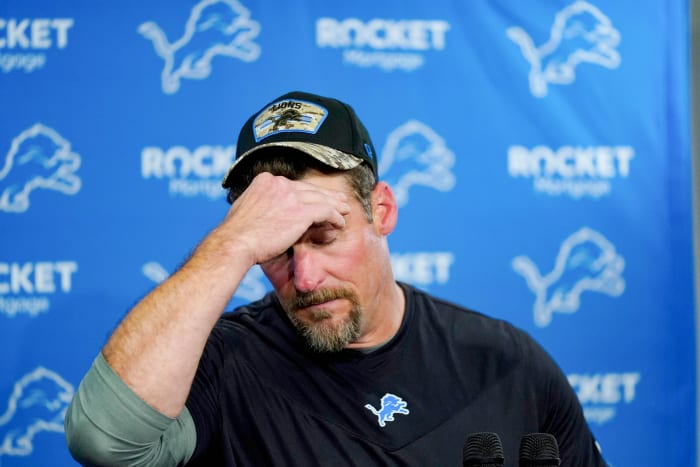
Campbell inherited a team that has won as many playoff games since 1957 as the Browns have won in 2021.
Paul Sancya/AP/Shutterstock
The stark truth of rebuilding is that whoever starts the job rarely gets to finish it. The Browns are on their third GM and fourth coach since the start of the 2017 season, when they went 0–16. In the NBA, the 76ers are on their fifth lead basketball executive and second coach since they started their famous tanking “Process.” And in baseball, when the Astros went through their massive rebuild, Bo Porter managed them for two hopeless seasons before he was fired and A.J. Hinch took over.
However this season ends, Campbell will be a coach with a losing record. Imagine busting your a-- for years, getting your dream job and then having the world think you are failing at it. It would be natural to try to distance yourself from the stink. Campbell wears the record and doesn’t worry about who notices.
“It’s important that you don’t lose confidence,” Campbell says. “That you don’t lose hope.”
Campbell has yet to win a game in Detroit, but he has played and coached for playoff teams, and he wants his guys to know: This is not that different. It sounds like an absurd motivational trick. But listen:
“You’re playing for that NFC Championship game, or the Super Bowl. Man, your margin for error is this small, right? Because it’s the same [for] the other team. They’re so good. That’s the reason you guys are playing: You’re the two best out of the NFL. And so one mistake will kill you. … Well, we’re kind of that way. We’re just on the other end of the spectrum.”
If being 0–8 has made Campbell doubt himself, he hasn’t shown it. He has received texts from coaching friends, but he says he hasn’t reached out to any, because he knows what they will say. Stay the course. Be true to yourself.
Yeah, yeah. He’s heard it all before. Dan Campbell doesn’t need a pep talk. He’s trying to win the next game, man. Win the next game.
• Tales From Tom Brady’s Forgotten Rookie Year
• Mystery and Controversy Surrounding the Original Rams Horns Helmet
• How a Women’s Football Team Took Control Away From the Men



































